人教版九年级全册 Unit 6 When was it invented?Section A 3a-4c 课件 (共33张PPT)
文档属性
| 名称 | 人教版九年级全册 Unit 6 When was it invented?Section A 3a-4c 课件 (共33张PPT) | 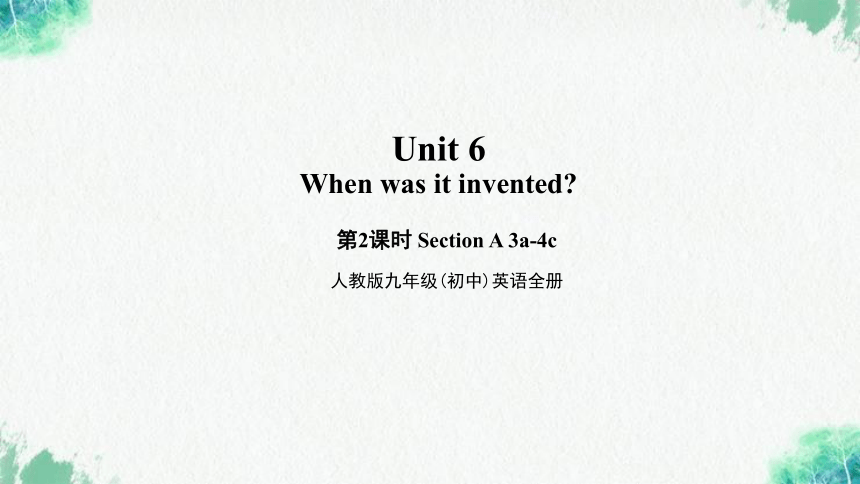 | |
| 格式 | zip | ||
| 文件大小 | 2.2MB | ||
| 资源类型 | 教案 | ||
| 版本资源 | 人教新目标(Go for it)版 | ||
| 科目 | 英语 | ||
| 更新时间 | 2022-11-01 22:00:06 | ||
图片预览

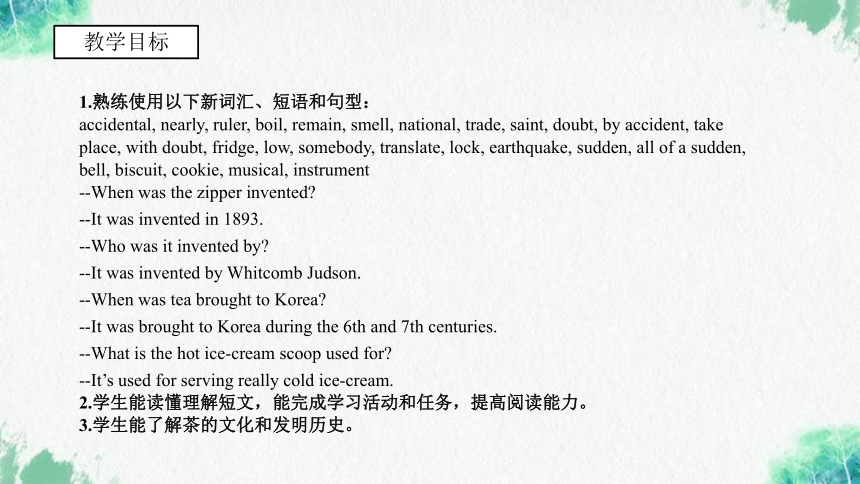
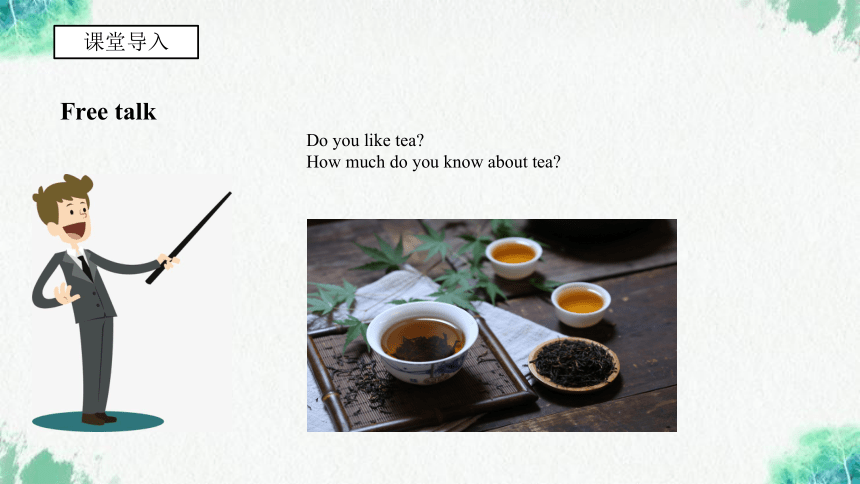
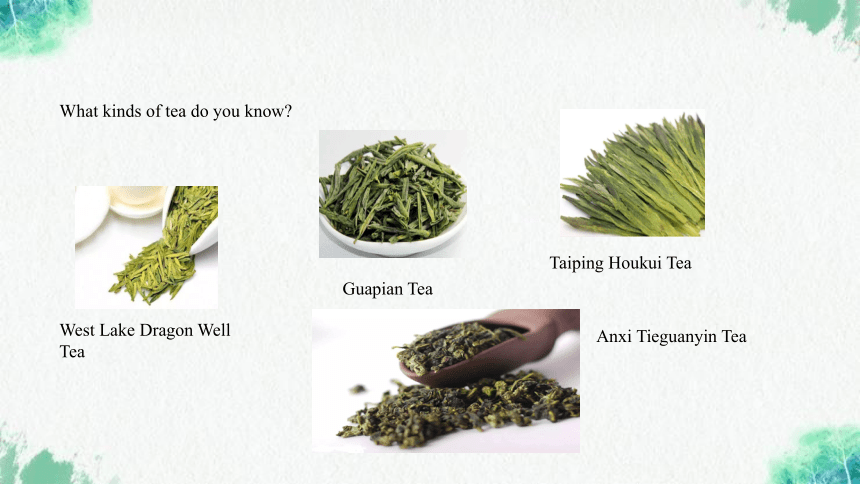
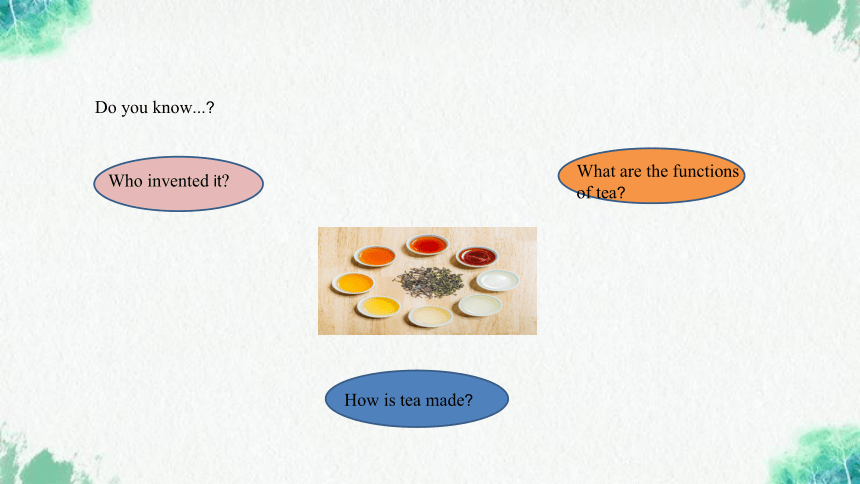
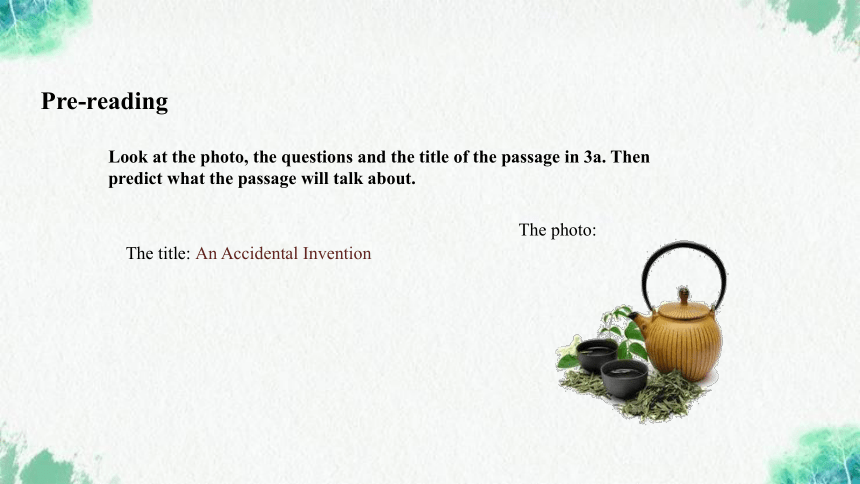
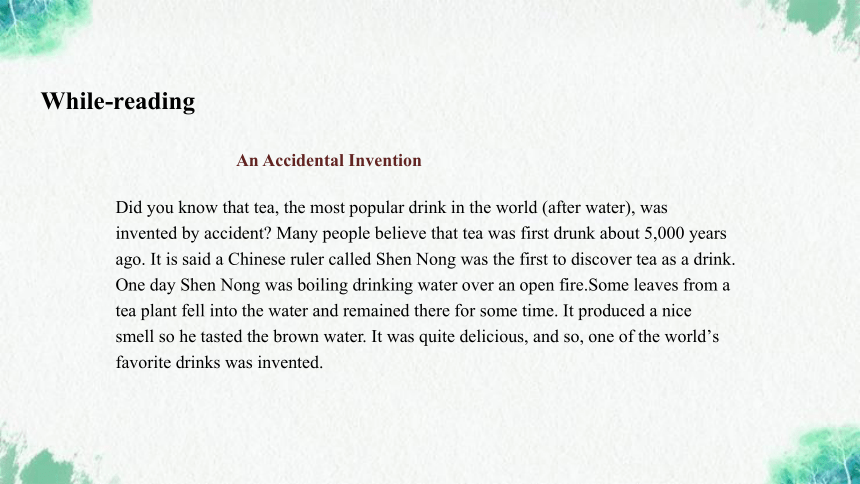
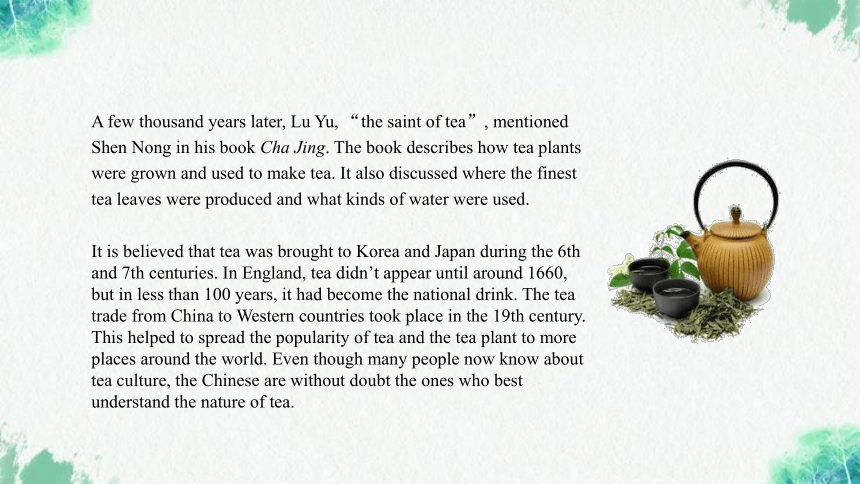
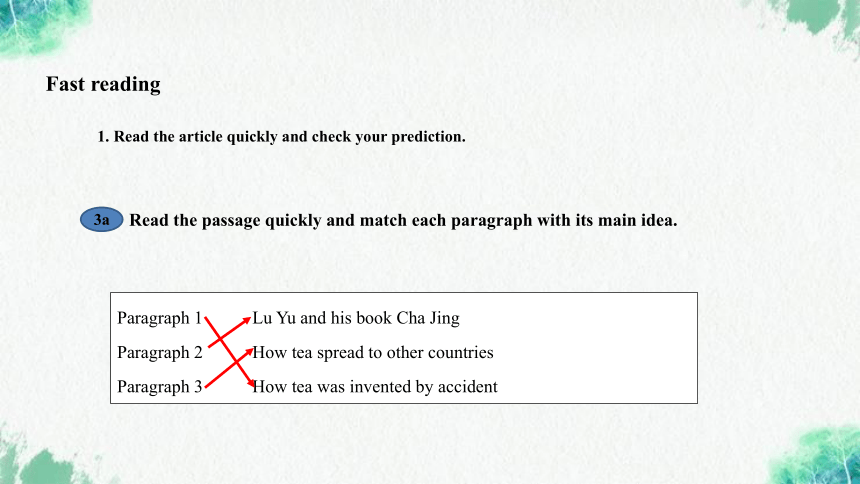
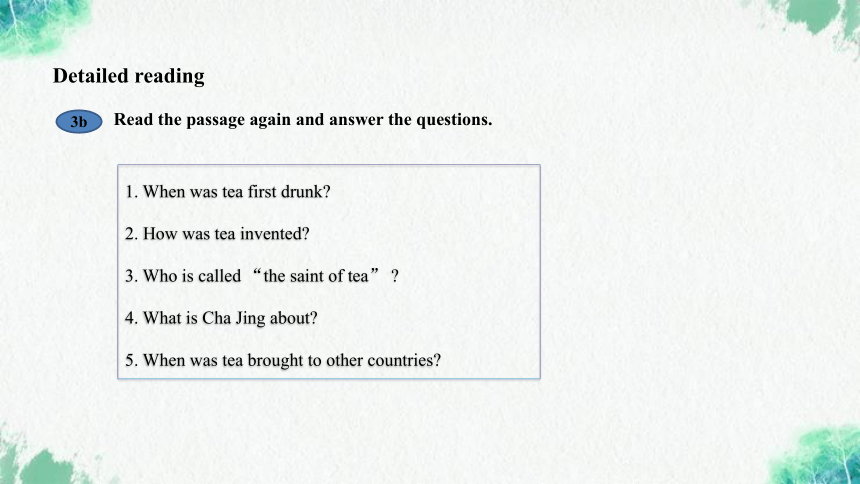
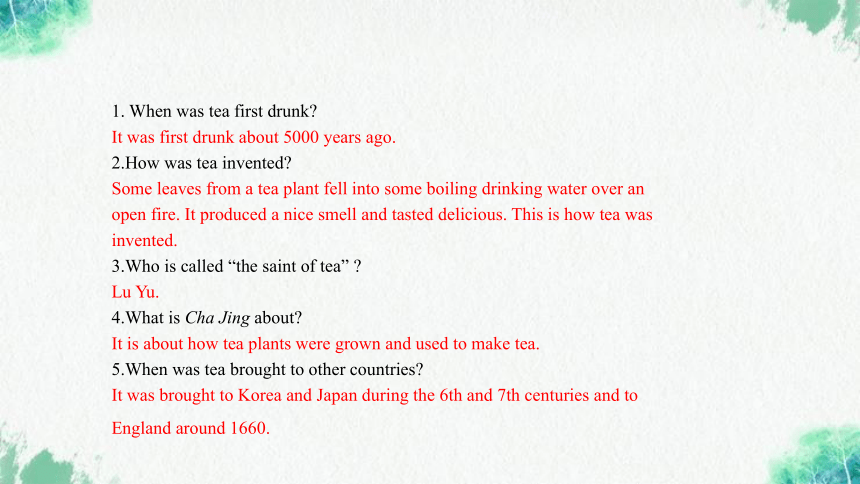
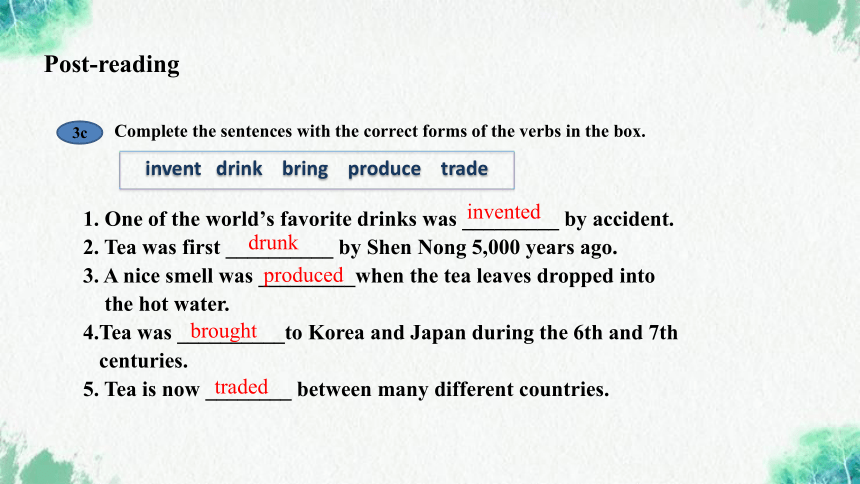
文档简介
(共33张PPT)
人教版九年级(初中)英语全册
Unit 6
When was it invented
第2课时 Section A 3a-4c
1.熟练使用以下新词汇、短语和句型:
accidental, nearly, ruler, boil, remain, smell, national, trade, saint, doubt, by accident, take place, with doubt, fridge, low, somebody, translate, lock, earthquake, sudden, all of a sudden, bell, biscuit, cookie, musical, instrument
--When was the zipper invented
--It was invented in 1893.
--Who was it invented by
--It was invented by Whitcomb Judson.
--When was tea brought to Korea
--It was brought to Korea during the 6th and 7th centuries.
--What is the hot ice-cream scoop used for
--It’s used for serving really cold ice-cream.
2.学生能读懂理解短文,能完成学习活动和任务,提高阅读能力。
3.学生能了解茶的文化和发明历史。
教学目标
Free talk
Do you like tea
How much do you know about tea
课堂导入
What kinds of tea do you know
West Lake Dragon Well Tea
Guapian Tea
Taiping Houkui Tea
Anxi Tieguanyin Tea
Who invented it
What are the functions of tea
How is tea made
Do you know...
Pre-reading
Look at the photo, the questions and the title of the passage in 3a. Then predict what the passage will talk about.
The title: An Accidental Invention
The photo:
While-reading
An Accidental Invention
Did you know that tea, the most popular drink in the world (after water), was invented by accident Many people believe that tea was first drunk about 5,000 years ago. It is said a Chinese ruler called Shen Nong was the first to discover tea as a drink. One day Shen Nong was boiling drinking water over an open fire.Some leaves from a tea plant fell into the water and remained there for some time. It produced a nice smell so he tasted the brown water. It was quite delicious, and so, one of the world’s favorite drinks was invented.
A few thousand years later, Lu Yu, “the saint of tea”, mentioned Shen Nong in his book Cha Jing. The book describes how tea plants were grown and used to make tea. It also discussed where the finest tea leaves were produced and what kinds of water were used.
It is believed that tea was brought to Korea and Japan during the 6th and 7th centuries. In England, tea didn’t appear until around 1660, but in less than 100 years, it had become the national drink. The tea trade from China to Western countries took place in the 19th century. This helped to spread the popularity of tea and the tea plant to more places around the world. Even though many people now know about tea culture, the Chinese are without doubt the ones who best understand the nature of tea.
3a
Read the passage quickly and match each paragraph with its main idea.
Paragraph 1 Lu Yu and his book Cha Jing
Paragraph 2 How tea spread to other countries
Paragraph 3 How tea was invented by accident
Fast reading
1. Read the article quickly and check your prediction.
3b
Read the passage again and answer the questions.
1. When was tea first drunk
2. How was tea invented
3. Who is called “the saint of tea”
4. What is Cha Jing about
5. When was tea brought to other countries
Detailed reading
1. When was tea first drunk
It was first drunk about 5000 years ago.
2.How was tea invented
Some leaves from a tea plant fell into some boiling drinking water over an open fire. It produced a nice smell and tasted delicious. This is how tea was invented.
3.Who is called “the saint of tea”
Lu Yu.
4.What is Cha Jing about
It is about how tea plants were grown and used to make tea.
5.When was tea brought to other countries
It was brought to Korea and Japan during the 6th and 7th centuries and to England around 1660.
3c
Complete the sentences with the correct forms of the verbs in the box.
invent drink bring produce trade
1. One of the world’s favorite drinks was _________ by accident.
2. Tea was first __________ by Shen Nong 5,000 years ago.
3. A nice smell was _________when the tea leaves dropped into
the hot water.
4.Tea was __________to Korea and Japan during the 6th and 7th
centuries.
5. Tea is now ________ between many different countries.
invented
drunk
produced
brought
traded
Post-reading
1.Ask the students to retell the passage according to the table above and the sentences in 3a.
Paragraph 1 Lu Yu and his book Cha Jing
Paragraph 2 How tea spread to other countries
Paragraph 3 How tea was invented by accident
1. by accident “偶然;意外地”,相当于by chance ,其反义词组为on purpose(故意地)。
He got the secret by accident yesterday.
昨天他偶然得知了这个秘密。
Many important discoveries were made by accident.
很多重要的发现都是在偶然情况下发生的。
2. It is said that a Chinese ruler called Shen Nong was the first to discover tea as a drink.
据说有一位叫作神农的中国统治者最早发现了茶可以饮用。
(1)It is said that意为“据说……”。其中it作形式主语,真正的主语是that引导的从句。
It is said that they have found water on Mars.据说他们在火星上发现了水。
(2)the first to do sth. 意为“第一个做某事的人”,是“the + 序数词+to do sth.”结构,动词不定式作定语。
Mary is always the first to arrive at the classroom. 玛丽总是第一个到教室。
You are the second to ask me that question. 你是第二个向我提出那个问题的人。
重要知识点
3. fall into 掉进;落入(圈套);陷入
He fell into the river. 他掉进河里。
The child fell into the lake and had to be pulled out. 小孩落入湖中,必须把他拉上来。
【拓展】 与fall相关的短语:
fall behind落后 fall down摔倒 fall off掉下 fall asleep入睡
4. remain作不及物动词,意为“剩下;停留;逗留”。
A few pears remain on the trees. 树上还留有几个梨。
She remained in her office all afternoon. 她整个下午都待在办公室里。
【拓展】remain用作连系动词时,意为“保持;仍是”,后接形容词、名词、动词-ing形式或介词短语作表语。
The room remains cool all summer. 这个房间整个夏天都保持凉爽。
She remained sitting when they came in. 他们进来时,她仍然坐着。
5. It is believed that…意为“人们认为/相信……”,其中it为形式主语,真正的主语是that引导的从句。
It is believed that health is above wealth.
人们相信健康重于财富。
【拓展】类似的句型还有:It is said that...据说……;It is reported that ...据报道……;It’s known that ...众所周知……;It is supposed/thought that…人们认为……。
6. not…until… 直到……才……
主句的动词一般是非延续性动词,它所表示的动作直到until所表示的时间才发生。until可作介词,其后接表示时间的名词,也可作连词,引导时间状语从句。例句:
I read until two o’clock. 我看书一直到两点。
You can’t leave until your work is finished.直到你的工作完成你才能离开。
7. less than意为“较少,比……少;不及,不如”。
We got there in less than two hours. 不到2个小时我们就到那儿了。
He sleeps less than seven hours every night. 他每晚的睡眠时间不到7小时。
8. take place发生;出现常指有计划、有安排地“发生”,是不及物动词短语,不能接宾语,一般也不用作被动结构。
The meeting will take place in the hall. 会议将在大厅举行。
take place 和 happen的用法比较。
1) take place 表示“发生、举行、举办”,一般指非偶然性事件的“发生”,即这种事件的发生一定有某种原因或事先的安排。
Great changes have taken place in our hometown during the past ten years.
The Olympic Games of 2008 took place in Beijing.
2) happen作“发生、碰巧”解,一般用于偶然或突发性事件。
What happened to you 你怎么了?
Maybe something unexpected happened.
【注意】:happen 与 take place 通常都没有被动语态。
9. without doubt 毫无疑问;的确
He is without doubt the cleverest student I've ever taught. 他确实是我所教过的学生中最聪明的。
Without doubt this is the best.无疑地这是最好的。
doubt n. 怀疑;疑惑 v. 怀疑;不信任; in doubt怀疑;拿不定主意
no / without / beyond doubt 无疑地;必定;当然
make no doubt of 对……毫不怀疑
When he read the letter, his doubts cleared away. 他读了那封信以后,心中的疑虑消除了。
He explained away her doubts. 他通过解释消除了她的怀疑。
His honesty is beyond doubt. 他的诚实毫无疑问。
Grammar Focus
When was the zipper invented It was invented in 1893.
Who was it invented by It was invented by Whitcomb Judson.
When was tea brought to Korea It was brought to Korea during the 6th and 7th centuries.
What is the hot ice-cream scoop used for It’s used for serving really cold ice-cream.
Active Voice : Alexander Graham Bell invented the telephone in 1876. Passive Voice: The telephone was invented (by Alexander Graham Bell) in 1876.
Grammar Focus
1. 被动语态
一般现在时的被动语态:am / are / is (not)+动词的过去分词
一般过去时的被动语态:was / were(not) +动词的过去分词
疑问句形式:一般疑问句:Was/Were+主语+及物动词的过去分词(+by …)
特殊疑问:特殊疑问词+was/were+主语+及物动词的过去分词( +by...)
Many people speak English. (主动语态)
English is spoken by many people.(被动语态)
The naughty boy broke the window yesterday. (主动语态)
The window was broken ( by the naughty boy) yesterday.(被动语态)
Grammar Focus
2. 一般过去时的被动语态的基本用法
(1)表示过去某一具体时间发生的动作,且句子的主语是谓语动词动作的承受者
The house was built in 1990.这所房子建于1990年。
(2)讲述发生在过去的动作,且不知道动作的执行者
He was honored with the name “ Father of Hybrid Rice”.
他被授予“杂交水稻之父”的称号
3. 含双宾语和复合宾语的主动句变为被动语态的方法
①含有双宾语的主动句变为被动语态时,通常把指 “人”的间接宾语变为主语,而指“物”的直接宾语则不变。
He gave me a book yesterday.
Grammar Focus
②如果要把指“物”的直接宾语变为主语,则在间接宾语前加to或for。
I brought him some food.
Some food was brought to him (by me).
③含有复合宾语的主动句变为被动语态时,要将其中的宾语变成主语,宾语补足语不变。
Jim asked Tom to go for a walk.
Tom was asked (by Jim) to go for a walk.
④ 如果宾语补足语是不带to的动词不定式,主动语态变成被动语态时要加上不定式符号 to。
We often heard Kate sing in the room.
Kate was often heard to sing in the room (by us).
4a
Rewrite the sentences using the passive voice.
They sold the fridge at a low price.
__________________________________________________
2. Somebody stole my camera from my hotel room.
___________________________________________________
3. Where did you take these photos
__________________________________________________
4. Our parents advised us not to go out alone.
___________________________________________________
5. Different writers translated the book into different languages.
______________________________________________________________
The book was translated into different languages by different writers.
We were advised not to go out alone by our parents.
The fridge was sold at a low price.
My camera was stolen from my hotel room (by somebody).
Where were these photos taken
4b
Complete the sentences with the correct forms of the verbs in the box.
eat lock like ring invite break tell bring
You _____________ to the party last night, weren’t you Why didn’t you go
2. The earthquake happened all of a sudden, but luckily the villagers _____________ to a safe place.
3. The door ___________ when we arrived, so we ______ the bell.
4. The students __________ not to eat or drink in class. But Ruby _______ the rule when she started eating a biscuit in science class.
5. The cookies ____________ by the hungry kids in less than 20 minutes, and they really ________ them.
were invited
were brought
was locked
broke
rang
were told
were eaten
liked
4c
Decide whether active or passive forms should be used in these sentences. Write the correct forms in the blanks.
The telephone _____________(invent) by Alexander Graham Bell. He __________ (born) in 1847. Mr. Bell ________ (work) on the invention of the telephone with Thomas Watson. In 1875, Mr. Bell _______ (learn) how to send musical notes through an instrument similar to a telephone. Finally, the telephone ____________ (invent) in 1876. The first sentence that ________ (say) on the telephone by Mr. Bell was “Mr. Watson, come here; I want to see you.” Today the telephone ________ (use) around the world.
was invented
was born
worked
learned
was invented
was said
is used
1. all of a sudden: 突然;猛地
可写作of a sudden, on a/the sudden 或all on a sudden.
例句:
All of a sudden, the lights went out. 突然,灯都灭了。
The boy began crying all of a sudden. 那个男孩突然开始哭起来。
2. luckily作副词,意为“幸运地”,也可换成to my luck或 luckily for me,其后通常用逗号与句子其他成分隔开。例句:
Luckily, she was at home when I called. 幸好当我打电话时她在家。
重要知识点
一、根据首字母提示补全单词填空。
1.He is b_____ water to make tea now.
2.Look! A few apples still r______ on the tree.Let's pick them now.
3.The chicken produces a nice s______.I want to eat it soon.
4.The old man is n______ 90 years old,but he is very strong.
oiling
emain
mell
early
二、单项选择。
( )1.Australian Open Tennis Championship(澳网公开赛)______ in January,2014.
A.happened B.took place
C.held D.was helding
( )2.It’s said that tea was invented _____.
A.by accident B.sudden C.at last D.for Chinese
( )3.A rabbit______ the hole and couldn't come out.
A.fell into B.fell off C.fell down D.fell
( )4.He won't come back_____ midnight.
A.at B.from C.until D.since
B
A
A
C
二、单项选择。
( )1.It was reported that nine people ______ in a balloon crash in Egypt on February
26th ,2013.
A.are killed B.were killed
C.will killed D.have killed
( )2.Lots of food and water______ to Ya'an,Sichuan Province immediately after the
earthquake happened.
A.were sent B.are sent
C.send D.sent
( )3.Flowers ______ along the road last year.
A.plant B.planted
C.are planted D.were planted
B
A
D
三、按要求完成句子。
1.You brought your English book to school yesterday.(改为被动语态)
Your English book _______ _______to school yesterday.
2.Your bag was put here.(改为否定句)
Your bag _______ _______ here.
3.Peter was allowed to take the test.(改为一般疑问句)
______Peter ________ to take the test
was
brought
wasn’t
put
was
allowed
What have we learned in this class
1. New words and phrases :
accidental, nearly, ruler, boil, remain, smell, national, trade, saint, doubt, by accident, take place, with doubt, fridge, low, somebody, translate, lock, earthquake, sudden, all of a sudden, bell, biscuit, cookie, musical, instrument
--When was the zipper invented
2. key sentences :
--When was the zipper invented --It was invented in 1893.
--Who was it invented by --It was invented by Whitcomb Judson.
--When was tea brought to Korea --It was brought to Korea during the 6th and 7th centuries.
--What is the hot ice-cream scoop used for --It’s used for serving really cold ice-cream.
3. Important language points:
(1) by accident用法 (2)It is said that...用法 (3)without doubt用法(4)not…until…用法
(5)fall into 用法 (6) remain用法 (7)take place 用法(8)less than 用法
课堂小结
1.Review the passive voice and make sentences with the passive voice.
2. Preview the contents of page 45.
家庭作业
Thank you!
人教版九年级(初中)英语全册
Unit 6
When was it invented
第2课时 Section A 3a-4c
1.熟练使用以下新词汇、短语和句型:
accidental, nearly, ruler, boil, remain, smell, national, trade, saint, doubt, by accident, take place, with doubt, fridge, low, somebody, translate, lock, earthquake, sudden, all of a sudden, bell, biscuit, cookie, musical, instrument
--When was the zipper invented
--It was invented in 1893.
--Who was it invented by
--It was invented by Whitcomb Judson.
--When was tea brought to Korea
--It was brought to Korea during the 6th and 7th centuries.
--What is the hot ice-cream scoop used for
--It’s used for serving really cold ice-cream.
2.学生能读懂理解短文,能完成学习活动和任务,提高阅读能力。
3.学生能了解茶的文化和发明历史。
教学目标
Free talk
Do you like tea
How much do you know about tea
课堂导入
What kinds of tea do you know
West Lake Dragon Well Tea
Guapian Tea
Taiping Houkui Tea
Anxi Tieguanyin Tea
Who invented it
What are the functions of tea
How is tea made
Do you know...
Pre-reading
Look at the photo, the questions and the title of the passage in 3a. Then predict what the passage will talk about.
The title: An Accidental Invention
The photo:
While-reading
An Accidental Invention
Did you know that tea, the most popular drink in the world (after water), was invented by accident Many people believe that tea was first drunk about 5,000 years ago. It is said a Chinese ruler called Shen Nong was the first to discover tea as a drink. One day Shen Nong was boiling drinking water over an open fire.Some leaves from a tea plant fell into the water and remained there for some time. It produced a nice smell so he tasted the brown water. It was quite delicious, and so, one of the world’s favorite drinks was invented.
A few thousand years later, Lu Yu, “the saint of tea”, mentioned Shen Nong in his book Cha Jing. The book describes how tea plants were grown and used to make tea. It also discussed where the finest tea leaves were produced and what kinds of water were used.
It is believed that tea was brought to Korea and Japan during the 6th and 7th centuries. In England, tea didn’t appear until around 1660, but in less than 100 years, it had become the national drink. The tea trade from China to Western countries took place in the 19th century. This helped to spread the popularity of tea and the tea plant to more places around the world. Even though many people now know about tea culture, the Chinese are without doubt the ones who best understand the nature of tea.
3a
Read the passage quickly and match each paragraph with its main idea.
Paragraph 1 Lu Yu and his book Cha Jing
Paragraph 2 How tea spread to other countries
Paragraph 3 How tea was invented by accident
Fast reading
1. Read the article quickly and check your prediction.
3b
Read the passage again and answer the questions.
1. When was tea first drunk
2. How was tea invented
3. Who is called “the saint of tea”
4. What is Cha Jing about
5. When was tea brought to other countries
Detailed reading
1. When was tea first drunk
It was first drunk about 5000 years ago.
2.How was tea invented
Some leaves from a tea plant fell into some boiling drinking water over an open fire. It produced a nice smell and tasted delicious. This is how tea was invented.
3.Who is called “the saint of tea”
Lu Yu.
4.What is Cha Jing about
It is about how tea plants were grown and used to make tea.
5.When was tea brought to other countries
It was brought to Korea and Japan during the 6th and 7th centuries and to England around 1660.
3c
Complete the sentences with the correct forms of the verbs in the box.
invent drink bring produce trade
1. One of the world’s favorite drinks was _________ by accident.
2. Tea was first __________ by Shen Nong 5,000 years ago.
3. A nice smell was _________when the tea leaves dropped into
the hot water.
4.Tea was __________to Korea and Japan during the 6th and 7th
centuries.
5. Tea is now ________ between many different countries.
invented
drunk
produced
brought
traded
Post-reading
1.Ask the students to retell the passage according to the table above and the sentences in 3a.
Paragraph 1 Lu Yu and his book Cha Jing
Paragraph 2 How tea spread to other countries
Paragraph 3 How tea was invented by accident
1. by accident “偶然;意外地”,相当于by chance ,其反义词组为on purpose(故意地)。
He got the secret by accident yesterday.
昨天他偶然得知了这个秘密。
Many important discoveries were made by accident.
很多重要的发现都是在偶然情况下发生的。
2. It is said that a Chinese ruler called Shen Nong was the first to discover tea as a drink.
据说有一位叫作神农的中国统治者最早发现了茶可以饮用。
(1)It is said that意为“据说……”。其中it作形式主语,真正的主语是that引导的从句。
It is said that they have found water on Mars.据说他们在火星上发现了水。
(2)the first to do sth. 意为“第一个做某事的人”,是“the + 序数词+to do sth.”结构,动词不定式作定语。
Mary is always the first to arrive at the classroom. 玛丽总是第一个到教室。
You are the second to ask me that question. 你是第二个向我提出那个问题的人。
重要知识点
3. fall into 掉进;落入(圈套);陷入
He fell into the river. 他掉进河里。
The child fell into the lake and had to be pulled out. 小孩落入湖中,必须把他拉上来。
【拓展】 与fall相关的短语:
fall behind落后 fall down摔倒 fall off掉下 fall asleep入睡
4. remain作不及物动词,意为“剩下;停留;逗留”。
A few pears remain on the trees. 树上还留有几个梨。
She remained in her office all afternoon. 她整个下午都待在办公室里。
【拓展】remain用作连系动词时,意为“保持;仍是”,后接形容词、名词、动词-ing形式或介词短语作表语。
The room remains cool all summer. 这个房间整个夏天都保持凉爽。
She remained sitting when they came in. 他们进来时,她仍然坐着。
5. It is believed that…意为“人们认为/相信……”,其中it为形式主语,真正的主语是that引导的从句。
It is believed that health is above wealth.
人们相信健康重于财富。
【拓展】类似的句型还有:It is said that...据说……;It is reported that ...据报道……;It’s known that ...众所周知……;It is supposed/thought that…人们认为……。
6. not…until… 直到……才……
主句的动词一般是非延续性动词,它所表示的动作直到until所表示的时间才发生。until可作介词,其后接表示时间的名词,也可作连词,引导时间状语从句。例句:
I read until two o’clock. 我看书一直到两点。
You can’t leave until your work is finished.直到你的工作完成你才能离开。
7. less than意为“较少,比……少;不及,不如”。
We got there in less than two hours. 不到2个小时我们就到那儿了。
He sleeps less than seven hours every night. 他每晚的睡眠时间不到7小时。
8. take place发生;出现常指有计划、有安排地“发生”,是不及物动词短语,不能接宾语,一般也不用作被动结构。
The meeting will take place in the hall. 会议将在大厅举行。
take place 和 happen的用法比较。
1) take place 表示“发生、举行、举办”,一般指非偶然性事件的“发生”,即这种事件的发生一定有某种原因或事先的安排。
Great changes have taken place in our hometown during the past ten years.
The Olympic Games of 2008 took place in Beijing.
2) happen作“发生、碰巧”解,一般用于偶然或突发性事件。
What happened to you 你怎么了?
Maybe something unexpected happened.
【注意】:happen 与 take place 通常都没有被动语态。
9. without doubt 毫无疑问;的确
He is without doubt the cleverest student I've ever taught. 他确实是我所教过的学生中最聪明的。
Without doubt this is the best.无疑地这是最好的。
doubt n. 怀疑;疑惑 v. 怀疑;不信任; in doubt怀疑;拿不定主意
no / without / beyond doubt 无疑地;必定;当然
make no doubt of 对……毫不怀疑
When he read the letter, his doubts cleared away. 他读了那封信以后,心中的疑虑消除了。
He explained away her doubts. 他通过解释消除了她的怀疑。
His honesty is beyond doubt. 他的诚实毫无疑问。
Grammar Focus
When was the zipper invented It was invented in 1893.
Who was it invented by It was invented by Whitcomb Judson.
When was tea brought to Korea It was brought to Korea during the 6th and 7th centuries.
What is the hot ice-cream scoop used for It’s used for serving really cold ice-cream.
Active Voice : Alexander Graham Bell invented the telephone in 1876. Passive Voice: The telephone was invented (by Alexander Graham Bell) in 1876.
Grammar Focus
1. 被动语态
一般现在时的被动语态:am / are / is (not)+动词的过去分词
一般过去时的被动语态:was / were(not) +动词的过去分词
疑问句形式:一般疑问句:Was/Were+主语+及物动词的过去分词(+by …)
特殊疑问:特殊疑问词+was/were+主语+及物动词的过去分词( +by...)
Many people speak English. (主动语态)
English is spoken by many people.(被动语态)
The naughty boy broke the window yesterday. (主动语态)
The window was broken ( by the naughty boy) yesterday.(被动语态)
Grammar Focus
2. 一般过去时的被动语态的基本用法
(1)表示过去某一具体时间发生的动作,且句子的主语是谓语动词动作的承受者
The house was built in 1990.这所房子建于1990年。
(2)讲述发生在过去的动作,且不知道动作的执行者
He was honored with the name “ Father of Hybrid Rice”.
他被授予“杂交水稻之父”的称号
3. 含双宾语和复合宾语的主动句变为被动语态的方法
①含有双宾语的主动句变为被动语态时,通常把指 “人”的间接宾语变为主语,而指“物”的直接宾语则不变。
He gave me a book yesterday.
Grammar Focus
②如果要把指“物”的直接宾语变为主语,则在间接宾语前加to或for。
I brought him some food.
Some food was brought to him (by me).
③含有复合宾语的主动句变为被动语态时,要将其中的宾语变成主语,宾语补足语不变。
Jim asked Tom to go for a walk.
Tom was asked (by Jim) to go for a walk.
④ 如果宾语补足语是不带to的动词不定式,主动语态变成被动语态时要加上不定式符号 to。
We often heard Kate sing in the room.
Kate was often heard to sing in the room (by us).
4a
Rewrite the sentences using the passive voice.
They sold the fridge at a low price.
__________________________________________________
2. Somebody stole my camera from my hotel room.
___________________________________________________
3. Where did you take these photos
__________________________________________________
4. Our parents advised us not to go out alone.
___________________________________________________
5. Different writers translated the book into different languages.
______________________________________________________________
The book was translated into different languages by different writers.
We were advised not to go out alone by our parents.
The fridge was sold at a low price.
My camera was stolen from my hotel room (by somebody).
Where were these photos taken
4b
Complete the sentences with the correct forms of the verbs in the box.
eat lock like ring invite break tell bring
You _____________ to the party last night, weren’t you Why didn’t you go
2. The earthquake happened all of a sudden, but luckily the villagers _____________ to a safe place.
3. The door ___________ when we arrived, so we ______ the bell.
4. The students __________ not to eat or drink in class. But Ruby _______ the rule when she started eating a biscuit in science class.
5. The cookies ____________ by the hungry kids in less than 20 minutes, and they really ________ them.
were invited
were brought
was locked
broke
rang
were told
were eaten
liked
4c
Decide whether active or passive forms should be used in these sentences. Write the correct forms in the blanks.
The telephone _____________(invent) by Alexander Graham Bell. He __________ (born) in 1847. Mr. Bell ________ (work) on the invention of the telephone with Thomas Watson. In 1875, Mr. Bell _______ (learn) how to send musical notes through an instrument similar to a telephone. Finally, the telephone ____________ (invent) in 1876. The first sentence that ________ (say) on the telephone by Mr. Bell was “Mr. Watson, come here; I want to see you.” Today the telephone ________ (use) around the world.
was invented
was born
worked
learned
was invented
was said
is used
1. all of a sudden: 突然;猛地
可写作of a sudden, on a/the sudden 或all on a sudden.
例句:
All of a sudden, the lights went out. 突然,灯都灭了。
The boy began crying all of a sudden. 那个男孩突然开始哭起来。
2. luckily作副词,意为“幸运地”,也可换成to my luck或 luckily for me,其后通常用逗号与句子其他成分隔开。例句:
Luckily, she was at home when I called. 幸好当我打电话时她在家。
重要知识点
一、根据首字母提示补全单词填空。
1.He is b_____ water to make tea now.
2.Look! A few apples still r______ on the tree.Let's pick them now.
3.The chicken produces a nice s______.I want to eat it soon.
4.The old man is n______ 90 years old,but he is very strong.
oiling
emain
mell
early
二、单项选择。
( )1.Australian Open Tennis Championship(澳网公开赛)______ in January,2014.
A.happened B.took place
C.held D.was helding
( )2.It’s said that tea was invented _____.
A.by accident B.sudden C.at last D.for Chinese
( )3.A rabbit______ the hole and couldn't come out.
A.fell into B.fell off C.fell down D.fell
( )4.He won't come back_____ midnight.
A.at B.from C.until D.since
B
A
A
C
二、单项选择。
( )1.It was reported that nine people ______ in a balloon crash in Egypt on February
26th ,2013.
A.are killed B.were killed
C.will killed D.have killed
( )2.Lots of food and water______ to Ya'an,Sichuan Province immediately after the
earthquake happened.
A.were sent B.are sent
C.send D.sent
( )3.Flowers ______ along the road last year.
A.plant B.planted
C.are planted D.were planted
B
A
D
三、按要求完成句子。
1.You brought your English book to school yesterday.(改为被动语态)
Your English book _______ _______to school yesterday.
2.Your bag was put here.(改为否定句)
Your bag _______ _______ here.
3.Peter was allowed to take the test.(改为一般疑问句)
______Peter ________ to take the test
was
brought
wasn’t
put
was
allowed
What have we learned in this class
1. New words and phrases :
accidental, nearly, ruler, boil, remain, smell, national, trade, saint, doubt, by accident, take place, with doubt, fridge, low, somebody, translate, lock, earthquake, sudden, all of a sudden, bell, biscuit, cookie, musical, instrument
--When was the zipper invented
2. key sentences :
--When was the zipper invented --It was invented in 1893.
--Who was it invented by --It was invented by Whitcomb Judson.
--When was tea brought to Korea --It was brought to Korea during the 6th and 7th centuries.
--What is the hot ice-cream scoop used for --It’s used for serving really cold ice-cream.
3. Important language points:
(1) by accident用法 (2)It is said that...用法 (3)without doubt用法(4)not…until…用法
(5)fall into 用法 (6) remain用法 (7)take place 用法(8)less than 用法
课堂小结
1.Review the passive voice and make sentences with the passive voice.
2. Preview the contents of page 45.
家庭作业
Thank you!
同课章节目录
- Unit 1 How can we become good learners.
- Section A
- Section B
- Unit 2 I think that mooncakes are delicious!
- Section A
- Section B
- Unit 3 Could you please tell me where the restroom
- Section A
- Section B
- Unit 4 I used to be afraid of the dark.
- Section A
- Section B
- Unit 5 What are the shirts made of?
- Section A
- Section B
- Review of Units 1-5
- Unit 6 When was it invented?
- Section A
- Section B
- Unit 7 Teenagers should be allowed to choose their
- Section A
- Section B
- Unit 8 It must belong to Carla.
- Section A
- Section B
- Unit 9 I like music that I can dance to.
- Section A
- Section B
- Unit 10 You're supposed to shake hands.
- Section A
- Section B
- Review of Units 6-10
- Unit 11 Sad movies make me cry.
- Section A
- Section B
- Unit 12 Life is full of the unexpected
- Section A
- Section B
- Unit 13 We're trying to save the earth!
- Section A
- Section B
- Unit 14 I remember meeting all of you in Grade 7.
- Section A
- Section B
- Review of Units 11-14
